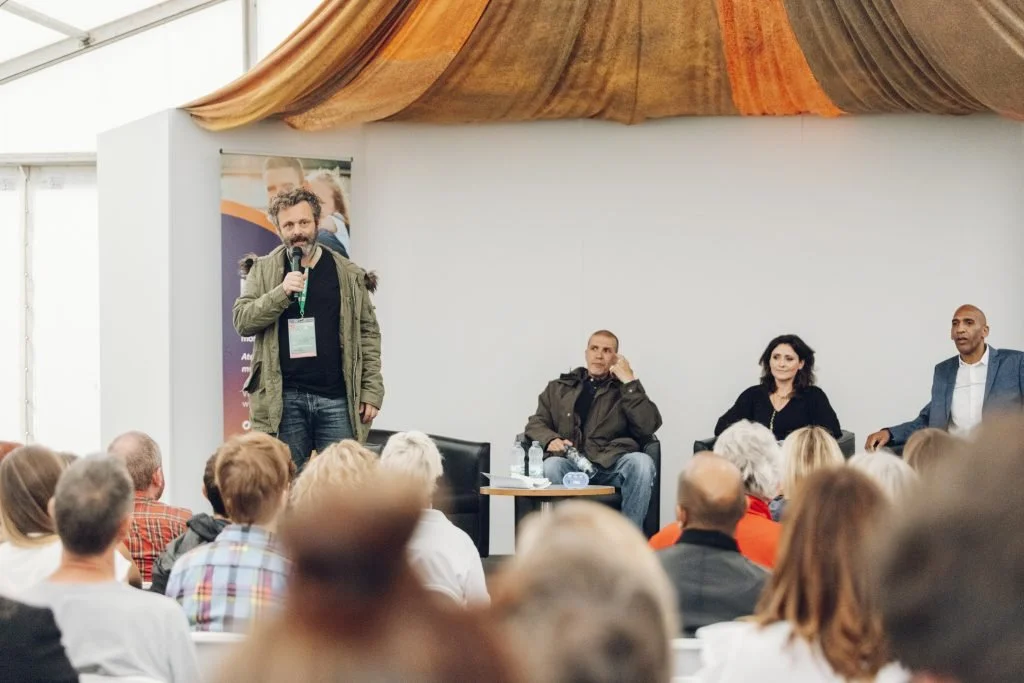“You can’t switch off, erase what happened from your life”
|Michael Sheen chairs an event at the Bevan Tent about the impact of wrongful conviction. Image: Mile44
“You can’t switch off, erase what happened from your life—it’s hard to be stigmatised.” — John Actie
Stigma: a mark of disgrace associated with a particular circumstance.
Although football is at the heart of Homeless World Cup, the tournament always seeks to embrace the wider issues around homelessness, isolation, and stigmatisation. At the Bevan Tent in Bute Park on Tuesday night, the latter was aired and discussed in heart-wrenching detail by three people involved in the story of the Cardiff Five, recently aired as a 13-part BBC podcast.
An audience spilling into the park listened to the debate around how the stigma of a proven wrongful conviction can mould and scar an innocent person for life.
Chaired by Michael Sheen, the panel featured Ceri Jackson (the BBC news journalist and creator of ‘Shreds: Murder in the dock’ podcast series), Kervin Julien (local activist and chairman of the campaign to free the Cardiff Five), and John Actie, one of the Cardiff Five wrongly accused for murder.
“A web of miscarriage of justice, corruption, and lack of justice,” Sheen outlined in his introduction.
For those unfamiliar with the story, Jackson outlined the background to the murder of a young local girl, Lynette White, on 14 February 1988 in Cardiff. Following the tragedy, South Wales Police issued a photo-fit image of a blood-stained, white male seen in the area at the time of the murder, but during a 10-month search were unable to trace the man.
In November 1988, the police charged five black and mixed-race men with White’s murder, although none of the scientific evidence discovered at the crime scene could be linked to them. In November 1990, following what was then the longest murder trial in British history, three of the men were found guilty and sentenced to life imprisonment.
In December 1992, the convictions were quashed by the Court of Appeal, and in January 2002 new technology enabled police to gain a new DNA profile that led to the arrest of, confession from, and life imprisonment of the real murderer, Jeffrey Gafoor. A lengthy review of the conduct of police officers in the original enquiry began in 2004—the subsequent trial was the largest police corruption trial in British criminal history. The law was changed related to interrogation. The trial collapsed in 2011.
“I was asked to create a piece for the BBC website in 2018, on the 30th anniversary of the murder,” she continues, “but I thought there was so much more to the story … and a podcast was the best medium in which to tell that story.”
Julien, who arrived in the docks area of Cardiff from Notting Hill, London, in the years leading up to the murder and knew the area and those involved well, painted a picture of the tight-knit community and segregation of the area from the wider city of Cardiff at the time. How he knew Actie as “a mighty presence, a huge, physical character—he really could have been a professional rugby player.”
Slightly abashed at that description, Actie described himself at the time as “getting by, with my wife and kids. Of course I knew about the murder—I’d seen it on Crimewatch—they were looking for a white man with a cut hand—but I never anticipated a knock on the door that day, at 6am, to see the police standing there, come to arrest me for murder. I saw it on Crimewatch and 10 months later they came and got me.”
Although all five arrested men were completely exonerated and the police subsequently charged with corruption, Actie underlined how the stigma of the initial charge, the no-smoke-without-fire culture, meant: “This has been part of my life for 30 years and will be with me for the rest of my life. It’s been devastating for me and my family. I’ll never get over it. The Butetown [dock area] community has moved on, but at the time, this tore it apart.
“If Ceri hadn’t made this programme, most of you would never have known about what happened. After it was broadcast I even got some police coming up and shaking my hand—young guys not even 30, who weren’t even born when this happened.”
As the audience digested his words, Sheen turned to Actie and, drawing parallels with many of those competing in Cardiff, added: “The fact that you’re here, John, is a testament to what is possible, what people can endure and overcome.”
With the session drawing to a close, producer Jackson was asked the question on everyone’s lips: What happens now? “There are still many unanswered questions so, maybe a TV series. Or a film?”
Over to you, actor, producer, and director Michael Sheen OBE.
Words: Isobel Irvine
Images: Mile 44

